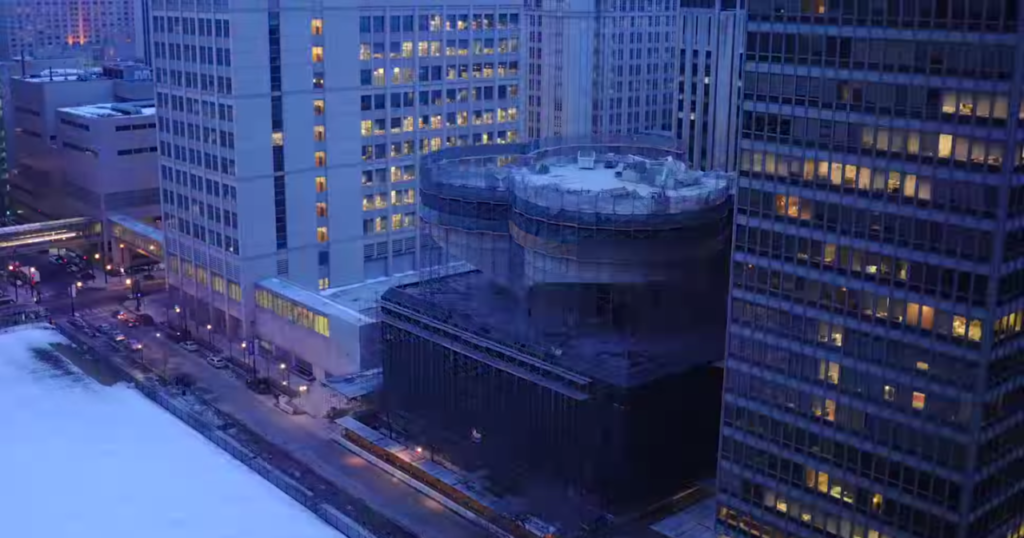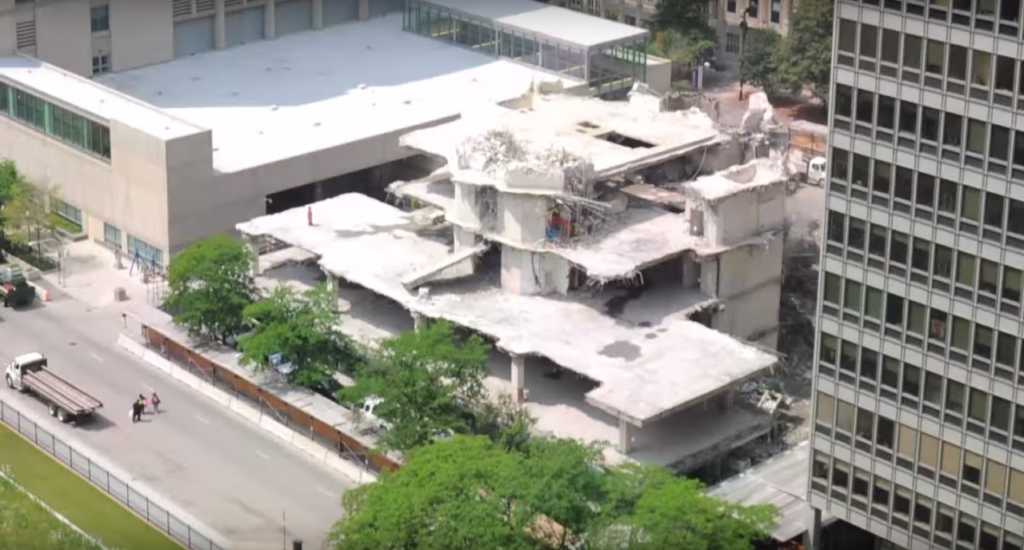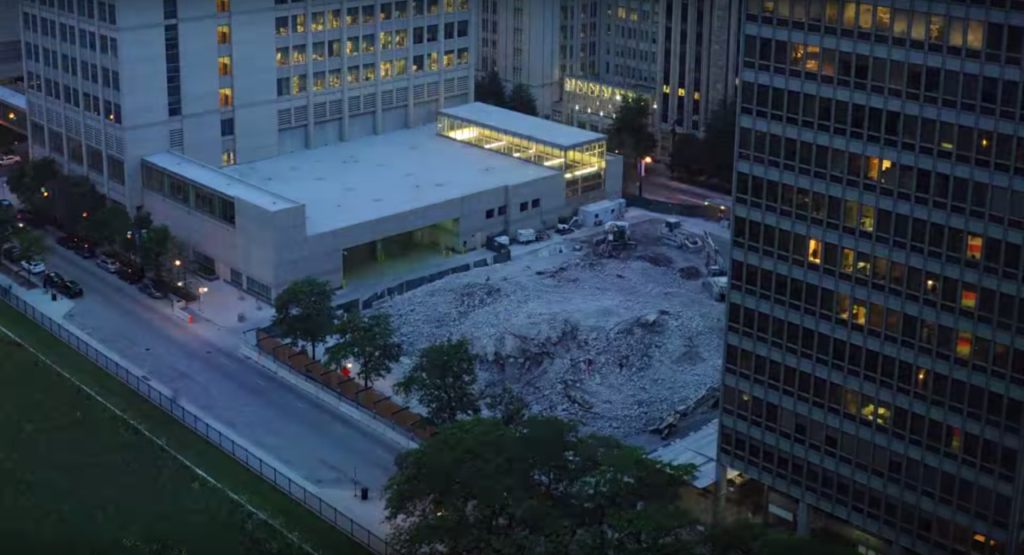from Discipline Park
TOBY ALTMAN
from Discipline Park
This poem is best viewed on a large screen.

fig. 8. I learned to seek liberty in restraint. At the time of this writing, all forms of liberation were suspect anyway. The landscape, once powerfully inhuman, began to be confused with the bodies interred within it. So that, in my notebook, I described a mass grave as a “pubic marsh” and apparently meant it. Of course, an unclaimed body belongs to the state. And when it is touched by the state, it turns state’s witness. “Somehow no one is guilty,” it announces to the court. Then, just for good measure, “I am not guilty. I own a late model Prius and my debts are mostly taken care of.” Same.
I wrote a book about marriage called idk but it works for me. I showed my friends photos of slaughtered buildings and said: “Imagine Hillary Clinton with the TNT pump or pushing the red button.” The question, I said, is not how to salvage the past, but how to destroy it ethically. My friends began to ask, with real concern, if I “like” brutalism. I was embarrassed. As though confessing a fetish. I like its honesty, I told them. At least it does not lie to you. At least it tells you what an institution is. An institution is a reasonable amount of cash and a safe place to hide it. Every other architecture I know tries to conceal this fact or to make it beautiful.
exuberant
———————————————-
—————————————–
bureaucracy
“It is a strange paradox that the benign ideology of the welfare state chose to be represented by an architectural style known as Brutalism. The market economy takes the exact opposite approach, concealing an essentially brutal rule behind a seemingly benign, ‘politically correct’ architectural language—survival of the fittest under the guise of common taste” (De Graaf and Baird).

fig. 11. The institution asks you to teach a class called How to Be Lonely. Funny you should ask. You stand in front of your students, dressed in your best black pants, and offer them eight lessons in loneliness. In the first lesson, you confess you feel no desire to renew life. You prize the dead—the minute action of their pens. By the second lesson, you have no students left. Should you continue? The institution does not answer your repeated emails. You present your second lesson to an empty room. In the second lesson, you describe the statue of Ceres atop the Board of Trade. She hangs above your city, swoon of silver, and she sings. Translated into the language of the living, her song is sweetness of commerce
In one of Bertrand’s early drawings, Prentice rises off thick columns: blunt teeth or vestigial lungs. Then it learns not to breathe. In another, it stands on a series of delicate legs, tucked beneath the tower’s mass. The sky appears as thick marrow. The heart is a bitter angle. Each drawing is somehow incompatible with the world, unbuildable or at least unbuilt. I look at these drawings alone in an archive. The archive is illegible. It provides a language of structure and support: Typical / Except / Plastic Glazing. Each drawing acts as a score for my unfolding. I begin to feel unfolded. Unfolded, I live “calf-deep / in debris.” “I don’t have any more nachos in my belly,” someone’s dad announces in the bathroom at the archive as he washes his hands. Then his buddy laughs.
displacement
———————————————————-
or information. Suffused with libido. As if she wished to caress the stocks exchanged beneath her. You try to reproduce her song for the class. “All my life / longing / to be / a wife,” you sing. Your voice is like bruised glass. After the second lesson, the institution politely asks you to refrain. You refuse to refrain. For the third lesson, you take your class on a field trip to a slaughter house. “How does it feel to be in the presence of this building?” you ask an empty school bus. Frankly, ok. You read from the guide book, “The building got its form entirely / from the functional / requirements of movement / of cattle / and the evisceration process.” As though compelled by the frenzy of the slaughter, you begin to dance. Your arms and legs resemble a prison in their intricate locking and unlocking. Now you are always dancing.
—————————————————-
park

fig. 14. I receive an email from the institution, asking for its money. “Dear Toby,” it says, “Your voice is still missing.” At the institution, I ask intimate questions like, “Who is speaking here?” “Do objects suffer?” “How can a wound be compassionately designed?” This is a condition of my money. I use these questions to own blocks of cheddar and bags of cereal. Shards of meat and shattered grain. Impossible to eat without making the carcass fruitful. Each eating puts a little nowhere in me. Each eating makes me. Palpable debt material. I buy these things and then my mouth becomes their cage. Come in and see the future of banking.
At the institution, a white man tells me, “There is no freedom to enjoy.” If you say so. In this film, the institution always appears unpeopled. The institution is a sponge for human presence. Is this what the white man meant? He uses the language of flourishing. “Are you trying to be in the room with many kinds of loss and presence?” he asks. I want to ask, “What kind of sex is left, and do I like it?” I want to say, “I am useful and straight. Last night I urged my wife to sew the word ‘perishable’ onto a pillow case.” She thinks this poem does not adequately announce its complicity. In the violence I am trying to name. To be named. “This is an essay on repetition,” the white man says. “There is no such thing.”
carnivorous
———————————————————-
—————————————————-
wage
A white man tells me. . . This particular white man is Lee Edelman, at a 2015 lecture called “There is No Freedom to Enjoy” (on Harriet Jacobs’ Incidents in the Life of a Fugitive Slave Girl). His argument, best I can recall, was that the demands of freedom and the demands of pleasure are irreconcilable. We can have one but not the other. Hence, we all live, as Jacobs’ writes about antebellum America, in a “house of unclean birds.” Nothing really heals. A night of sharp sleep puts the twist back in my shoulder. My grandfather liked to say, “All bleeding stops.” This was a joke. A surgical joke. All bleeding stops. Maybe not.
Toby Altman is the author of Arcadia, Indiana (Plays Inverse, 2017) and five chapbooks, including Security Theater (Present Tense Pamphlets, 2016) and Tender Industrial Fabric (Greying Ghost, 2015). His poems can or will be found in Colorado Review, jubilat, Lana Turner, and other journals and anthologies. He holds a PhD in English from Northwestern University and is currently a Teaching/Writing Fellow at the Iowa Writers’ Workshop.
